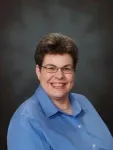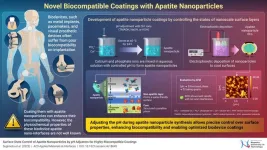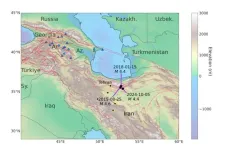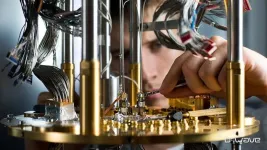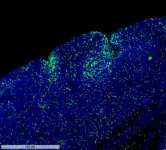(Press-News.org) PLYMOUTH MEETING, PA [February 4, 2025] — The National Comprehensive Cancer Network® (NCCN®) is joining people and organizations across the globe to commemorate World Cancer Day today. World Cancer Day is a global initiative to improve awareness and knowledge of cancer risks and actions for better prevention, detection, and treatment. It is led and organized by the Union of International Cancer Control (UICC) every February 4.
World Cancer Day 2025 marks the start of the ‘United by Unique’ campaign to highlight how every experience with cancer is unique, even as people touched by cancer are united by shared goals. The campaign calls for a fundamental shift in cancer care worldwide towards a people-centered approach.
NCCN has long worked to advance people-centered cancer care. The organization publishes the NCCN Clinical Practice Guidelines in Oncology (NCCN Guidelines®)—evidence-based expert consensus-driven recommendations for prevention, treatment, and supportive care. The expert panels tasked with maintaining these recommendations provide updates at least once every year. The panels are made up of multidisciplinary subject matter experts, including patient advocates who help make sure their perspectives inform treatment practices. Some of those advocates are sharing their unique stories in honor of this year’s World Cancer Day.
Decoding Chronic Cancer
Ruth Fein Revell is a journalist, author, and member of the NCCN Guidelines® Panel for Myeloproliferative Neoplasms (MPN). She has been living with chronic, evolving cancer for more than 30 years, after being first diagnosed at age 38.
“People feel invisible and misunderstood with chronic cancer,” explained Revell. “We don’t ever get to ring that proverbial bell that marks the end of our treatment. Having a rare disease, I often have to explain some of the things that I am experiencing, even to my doctors. Patients know their bodies best, and we’re all different. We face different symptoms and different risks.”
Revell recently shared more of her experience during an NCCN Patient Webinar on MPN, available on-demand at NCCN.org/patientwebinars. Her most-recent book is called The Big C2: Stories From the Chronic Side of Cancer. She noted that scientific advances have come a long way over the past 30 years, in life-changing ways. Those advances make care more successful, but also more complicated, highlighting the need for resources like the NCCN Guidelines and NCCN Guidelines for Patients®, which provide ready access to the very latest understandings in evidence-based care.
Fighting for Family
Laura Porter, MD, is a member of the NCCN Guidelines Panel for Colorectal Cancer Screening. She was diagnosed with metastatic colon cancer at 43, after struggling to be able to get a colonoscopy due to her young age and lack of family history of disease. By the time she was diagnosed, her tumor was the size of a grapefruit, and she nearly passed out from bleeding while out to dinner with her wife.
Since then, she has had multiple recurrences but has been disease-free for the last 18 years. Dr. Porter has channeled energy into various advocacy projects over the years, helping researchers to focus their attention on the things that make the biggest differences to the people they treat.
“Anybody who's a cancer survivor will tell you, life changes completely. Your new normal is definitely not normal,” said Dr. Porter. She also had to contend with living in the United States at a time when she was unable to get married. “We had to make sure that all the special paperwork was filled out so if something happened to me, my partner at the time, who is now my wife would be the one that was notified. That was incredibly stressful on top of everything else.”
United in Providing Trustworthy Information to Enable Shared Decision-Making
“At NCCN, we know that the best cancer care is patient-centered care that recognizes everyone’s unique perspective,” said Crystal S. Denlinger, MD, Chief Executive Officer, NCCN. “We are proud to champion informed, shared decision-making on World Cancer Day and every day.”
Dr. Denlinger noted that this is why NCCN publishes NCCN Guidelines for Patients—an award-winning collection of resources that put reliable, expert-vetted information into understandable terms so patients and caregivers can take a more active role in their treatment decisions. They are available for free at NCCN.org/patients or via the NCCN Patient Guides for Cancer App thanks to support from the NCCN Foundation®.
Learn more about NCCN’s patient advocate panel members, free resources for the entire cancer community, and this year’s World Cancer Day campaign by visiting NCCN.org/wcd.
# # #
About the National Comprehensive Cancer Network
The National Comprehensive Cancer Network® (NCCN®) is marking 30 years as a not-for-profit alliance of leading cancer centers devoted to patient care, research, and education. NCCN is dedicated to defining and advancing quality, effective, equitable, and accessible cancer care and prevention so all people can live better lives. The NCCN Clinical Practice Guidelines in Oncology (NCCN Guidelines®) provide transparent, evidence-based, expert consensus-driven recommendations for cancer treatment, prevention, and supportive services; they are the recognized standard for clinical direction and policy in cancer management and the most thorough and frequently-updated clinical practice guidelines available in any area of medicine. The NCCN Guidelines for Patients® provide expert cancer treatment information to inform and empower patients and caregivers, through support from the NCCN Foundation®. NCCN also advances continuing education, global initiatives, policy, and research collaboration and publication in oncology. Visit NCCN.org for more information.
About the NCCN Foundation
The NCCN Foundation is marking 15 years of empowering people with cancer and their caregivers by delivering unbiased expert guidance from the world’s leading cancer experts through the library of NCCN Guidelines for Patients® and other patient education resources. The NCCN Foundation is also committed to advancing cancer treatment by funding the nation’s promising young investigators at the forefront of cancer research. For more information about the NCCN Foundation, visit nccnfoundation.org.
END
Medical implants have transformed healthcare, offering innovative solutions with advanced materials and technologies. However, many biomedical devices face challenges like insufficient cell adhesion, leading to inflammatory responses after their implantation in the body. Apatite coatings, particularly hydroxyapatite (HA)—a naturally occurring form of apatite found in bones, have been shown to promote better integration with surrounding tissues. However, the biocompatibility of artificially synthesized apatite nanoparticles often falls short of expectations, primarily due to the nanoparticles’ limited ability to bind effectively with biological tissues.
To overcome ...
A new study debunks claims that a magnitude 4.5 earthquake in Iran was a covert nuclear weapons test, as widely alleged on social media and some mainstream news outlets in October 2024, a period of heightened geopolitical tensions in the Middle East.
Led by Johns Hopkins University scientists, the study warns about the potential consequences of mishandling and misinterpreting scientific information, particularly during periods of international conflict. The findings appear in the journal Seismica.
“There was a concerted misinformation and disinformation campaign around this event that promoted the idea this was a nuclear test, ...
Physicists have performed a groundbreaking simulation they say sheds new light on an elusive phenomenon that could determine the ultimate fate of the Universe.
Pioneering research in quantum field theory around 50 years ago proposed that the universe may be trapped in a false vacuum – meaning it appears stable but in fact could be on the verge of transitioning to an even more stable, true vacuum state. While this process could trigger a catastrophic change in the Universe's structure, experts agree that predicting the timeline ...
How Hungry Fat Cells Could Someday Starve Cancer to Death
Scientists transformed energy-storing white fat cells into calorie-burning ‘beige’ fat. Once implanted, they outcompeted tumors for resources, beating back five different types of cancer in lab experiments.
Liposuction and plastic surgery aren’t often mentioned in the same breath as cancer.
But they are the inspiration for a new approach to treating cancer that uses engineered fat cells to deprive tumors of nutrition.
Researchers at UC San Francisco used the gene editing technology CRISPR to turn ordinary white fat cells into “beige” fat cells, which voraciously consume calories to make ...
Brain cancer is the second-leading cause of death in children in the developed world. For the children who survive, standard treatments have long-term impacts on their development and quality of life, particularly in small children and infants.
Research out of Emory University and QIMR Berghofer Medical Research Institute in Queensland, Australia, has shown that a potential new targeted therapy for childhood brain cancer is effective in infiltrating and killing tumor cells in preclinical models tested in mice.
In ...
Scientists at The Hospital for Sick Children (SickKids) have discovered a way to stop tumour growth before it starts for a subtype of medulloblastoma, the most common childhood malignant brain cancer.
Brain cancer presents a unique set of challenges for researchers – by the time a person experiences symptoms, the tumours are often so complex that the fundamental mechanisms driving the tumour growth are no longer easy to identify. A research team led by Dr. Peter Dirks is working to combat ...
Preventing the cell’s protein factories from making the notorious cancer-causing protein MYC could stop out-of-control tumors.
For decades, scientists have tried to stop cancer by disabling the mutated proteins that are found in tumors. But many cancers manage to overcome this and continue growing.
Now, UCSF scientists think they can throw a wrench into the fabrication of a key growth-related protein, MYC, that escalates wildly in 70% of all cancers. Unlike some other targets of cancer therapies, MYC can be dangerous simply due to its abundance.
In a paper that appears Feb. 4 in Nature Cell Biology, researchers at UC San Francisco ...
SPOKANE, Wash. — Washington State University scientists have created genetically-engineered mice that could help accelerate anti-aging research.
Globally, scientists are working to unlock the secrets of extending human lifespan at the cellular level, where aging occurs gradually due to the shortening of telomeres–the protective caps at the ends of chromosomes that function like shoelace tips to prevent unraveling. As telomeres shorten over time, cells lose their ability to divide for healthy ...
The new EU-funded consortium “ForMovFluid” will study how fluids transformed the materials inside the Earth's crust. Thanks to the Marie Skłodowska-Curie Action Doctoral Networks programme, ForMovFluid will fund the doctoral studies of 18 researchers, and train them to become elite experts in the field of geoscience.
Moreover, this project will allow us to understand the origin of the so-called critical raw materials, of vital importance for the energy transition. Over a period of four years, ForMovFluid “Marie Curie” researchers ...
FRONTIERS announces a new call for applications for its Science Journalism in Residency Programme, funded by the European Research Council (ERC). This
third call is exclusively aimed at early-career journalists and will remain open until May 6, 2025, at 17h00 CEST.
Science journalists with up to five years of experience are invited to apply for a residency at a research institution of their choice, in an EU Member State or a
country associated with the EU’s Horizon Europe Programme. The residencies, lasting between three to five months, should focus on frontier science topics, in
collaboration with scientists.
The ...

